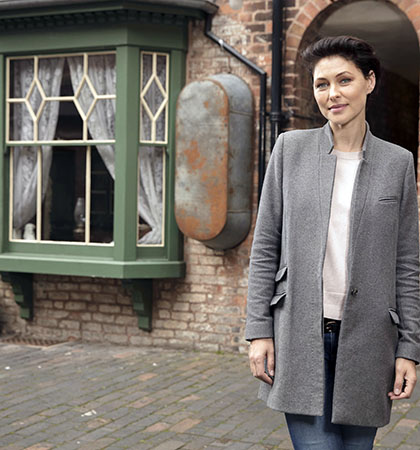TV PRESENTER Emma Willis was left stunned as she discovered one of her Irish ancestors was a 'murderous Orangeman' who tortured a Catholic blacksmith and his son.
Birmingham native Emma made the shock discovery while researching her family history in an upcoming episode of BBC One's Who Do You Think You Are?
Due to be screened next Thursday, August 3, Emma discovers that while one half of her paternal grandparents had deep Brummie roots, another family line goes back to Co. Wicklow.
Emma, who grew up in Birmingham with her parents and two sisters, learns from her dad that her great-great-grandmother, Margaret Kirwan, was born in Ireland to Michael Kirwan and Harriet Fowler.
Not realising that she had any Irish ancestry on her father’s side, Emma heads to Dublin to find out more.
 Emma Willis headed to Dublin to find out more about her Irish ancestors (Picture: BBC)
Emma Willis headed to Dublin to find out more about her Irish ancestors (Picture: BBC)At the Registry of Deeds, Emma finds out that the 1861 marriage of Michael and Harriet, her three-times great-grandparents, was an inter-faith marriage – he was Catholic and she was a Protestant.
Harriet’s father was Richard Fowler, who was listed on the marriage certificate as a 'gentleman'.
“I’m really surprised that someone’s a gentleman in my family," said Emma.
"Not because they’re not; all the men in my family are gentlemen! But a gentleman of old times, an esquire, someone who had land.”
Further records reveal that Richard – who is Emma’s four-times great-grandfather – was from Dunlavin in Co. Wicklow.
His father, Richard Fowler Sr, was, in 1790, a protestant landholder in Dunlavin – at that time a Protestant enclave during a period of sectarian tension.
Emma heads to the village to find out more about her five-times great-grandfather.
She discovers that an article from a newspaper of 1797 referred to Richard Sr as a 'notorious informer and a murderous Orangeman'.
In another newspaper from the same year, she reads a chilling account of how he and others raided the house of the local blacksmith – a Catholic – dragged him and his son from their beds, stabbed, beat and tortured them.
The pair, who were suspected of making weapons for the United Irishmen, were threatened with hanging and were only saved when a local man heard their screams and came to their aid.
Emma, horrified by her ancestor’s actions, said: “That's horrific. How can you defend doing that to somebody? That was exactly what I didn’t want to find out.”
While upset by this discovery, she takes solace in the fact that two generations later, Richard Sr's granddaughter Harriet married Michael, a Catholic, for love.
'An Irish genius'
Exploring Michael's branch of the family, she finds out that his father, also Michael Kirwan, was a marble mason who created an altar in the Franciscan Church in Limerick.
Overwhelmed when she sees her four-times great-grandfather’s fine work, she learns that this was a very new kind of work for an Irish Catholic craftsman as they were not allowed to practice their religion in public until the early 19th century, when a series of reforms permitting them to worship openly sparked a revival in church-building.
Emma is delighted to read that the altarpieces Michael Sr created were judged by his contemporaries to be equal in quality to the marble work in Catholic churches in continental Europe.
“Are they calling him a genius? An Irish genius?" she said.
“It’s overwhelming to walk into such a gorgeous building and to then know that the centerpiece of that building was made by your four-times great-grandfather. He crafted and touched it with his own hands."
Returning to Dublin where Michael Sr had his workshop, Emma learns that he became both a champion of Irish Home Rule and of workers’ rights.
He became an influential Dubliner and, in 1862, a key supporter of the creation of one of Dublin’s most important landmark – the statue of the Irish hero Daniel O’Connell that still stands on O’Connell Street today.

